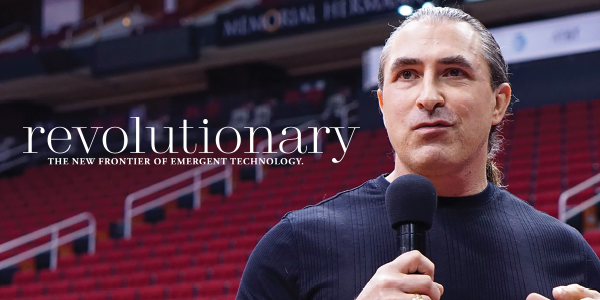Revolutionary
The New Frontier of Emergent Technology

As we transition beyond the daily challenges of the COVID-19 pandemic, we must prepare for the long-term uncertainty of a post-COVID world. A world that is irrevocably changed by a convergence of emergent technology, widespread economic disruption and an unprecedented shift to remote work, virtual collaboration and a fundamental reimagining of the traditional workplace. We in education and academia must also consider how we will adapt to serve students’ needs better as they enter one of the most competitive yet opportunity-rich economies since the Great Depression. What skills and experiences will students need? How should teaching practices evolve to maintain the many benefits of traditional, in-person education, while embracing the convenience, accessibility, and flexibility of online learning?
The Wisdom of Intellectual Charity and the Joy of Truth
Here, I find wisdom in two concepts with which I have become acquainted at St. Thomas. The first is that of “intellectual charity,” which Blum (2018) describes as “[a call to] the educator to recognize that the profound responsibility to lead the young to truth is nothing less than an act of love.” The second relates to St. Augustine’s expression of “Gaudium de Veritate” or the “joy of truth”—defined by Saint John Paul II (1990) as the “joy of searching for, discovering and communicating truth.” Accordingly, education must prepare students not only to pursue knowledge for the sake of completing degree requirements or securing a job but also to empower them to find joy in the very act of seeking, discovering and communicating truth and knowledge in all of its forms. In the spirit of “intellectual charity,” educators must also as a matter of love and responsibility, be bold, innovative and courageous in developing a responsive pedagogy that prepares students to find purpose and meaning through the pursuit and application of that knowledge.
Criteria for Meaningful Learning
In practical terms, I am a strong advocate of a socio-culturally situated approach to learning, which bases education on the personal experience of the student and provides an experiential framework that connects learning to real-world agency and impact (Larson & Marsh, 2005). As such, meaningful learning must meet three primary criteria: authentic (related to interests), relevant (connected to personal experience) and applicable (tied to goals, outcomes and purpose). In addition to guided instruction, this may include the academic integration of tools such as project-based learning, internships, volunteer work, student-led clubs and teams, and other experiences that combine skills acquisition, applied practice, and team-based collaboration.
The Role of Emergent Technologies
To the extent that certain emergent technologies will play an increasingly prominent role in all aspects of our personal, professional and civil lives, it is also essential that our students become conversant in the fundamentals of new technologies. Examples include cloud-based computing, artificial intelligence (AI), data science, augmented/virtual reality, esports and autonomous/robotic systems. However, it is equally critical that these technical skills sit in a holistic framework of Liberal Arts, Humanities and Social Sciences. I often tell engineering students, “Your job as an engineer is to make someone’s life better, happier, safer or more fulfilling.” When we apply a design-thinking lens, identifying a problem and ideating toward an applied solution, it becomes clear that we cannot identify and solve real-world problems without including the full range of interdisciplinary perspectives and expertise that reflects the global human experience.
Essential Cross-Disciplinary Collaboration
Therefore, the cross-disciplinary collaboration of educators is an essential catalyst that drives the academic growth and success of students. By this, I mean that archaeology students should learn about drone technology and forward-looking infrared (FLIR) as a tool for the topographic analysis of excavation sites. Teachers should become proficient in the virtual literacy skills necessary to teach online. MBA students should understand the relative cost/benefit value of switching from physical network architecture to a cloud-based system. And medical students should seek exposure to cutting-edge advances in augmented/virtual reality. More to the point, the future educator must be willing to embrace the traditional, the unconventional and the unexplored as vehicles for advancing an exciting new paradigm in education. This new frontier of “intellectual charity” both exemplifies and inspires a lifelong “Gaudium de Veritate” or “joy of truth.”
Dr. Cesare Wright
Director of Digital Media Initiatives and
Assistant Professor of Communication